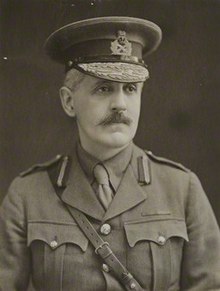Sir Fabian Ware | |
|---|---|
 Ware in October 1916 | |
| Born | 17 June 1869 Clifton, Bristol, England |
| Died | 28 April 1949 (aged 79) Barnwood, Gloucestershire, England |
| Allegiance | United Kingdom |
| Service | British Army |
| Years of service | 1915–1921; 1939–1944 |
| Rank | Major-general |
| Battles / wars | First World War Second World War |
| Awards | Knight Commander of the Royal Victorian Order Knight Commander of the Order of the British Empire Companion of the Order of the Bath Companion of the Order of St Michael and St George Mentioned in Despatches (2) Grand Officer of the Legion of Honour (France) Croix de guerre (France) Commander of the Order of the Crown (Belgium) |
Major-General Sir Fabian Arthur Goulstone Ware KCVO KBE CB CMG (17 June 1869 – 28 April 1949) was a British educator, journalist, and the founder of the Imperial War Graves Commission (IWGC), now the Commonwealth War Graves Commission (CWGC). He also served as Director of Education for the Transvaal Colony and editor of The Morning Post.
Born in Clifton, Bristol, he graduated from the University of Paris in 1894. After working in various education capacities, he travelled to the Transvaal Colony where, as a member of Milner's Kindergarten, he became Director of Education in 1903. Two years later, Ware became editor of The Morning Post and returned to England. While editor, he expanded the paper and reoriented it to focus on colonial affairs. After several controversies, culminating in a failed effort to purchase an airship for the United Kingdom, Ware was forced to retire in 1911.
When the First World War started in August 1914, Ware attempted to join the British Army but was rejected because he was too old. With the assistance of Alfred Milner, he obtained an appointment as the commander of a mobile ambulance unit provided by the British Red Cross Society. In this role he began marking and recording the graves of those killed. The unit soon began to focus exclusively on graves, and the organisation was transferred to the British Army in 1915. The following year the Army Department of Graves Registration and Enquiries was created with Ware at its head. On 21 May 1917 the Imperial War Graves Commission was founded. Ware served as vice-chairman. He ended the war as a major-general, having been mentioned in despatches twice.
Post-war, Ware was heavily involved in the IWGC's function. He frequently led negotiations with foreign nations over cemeteries and memorials, dealt with prominent figures in the commission, and worked to ensure the commission's financial security. Ware also attempted to raise support for his ideal of cooperation between the Dominions. In the lead-up to the Second World War, he attempted to use the IWGC's work as a tool for ensuring peace. When war broke out, he continued to serve as vice-chairman of the IWGC and was re-appointed director-general of Graves Registration and Enquiries. He retired from the Commission in 1948 and died the following year.